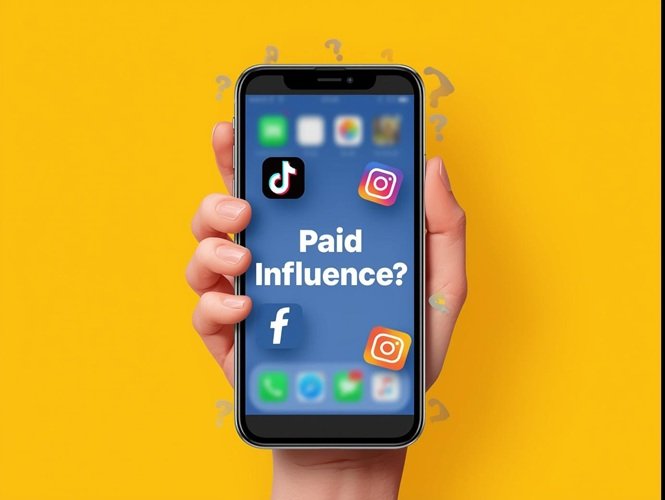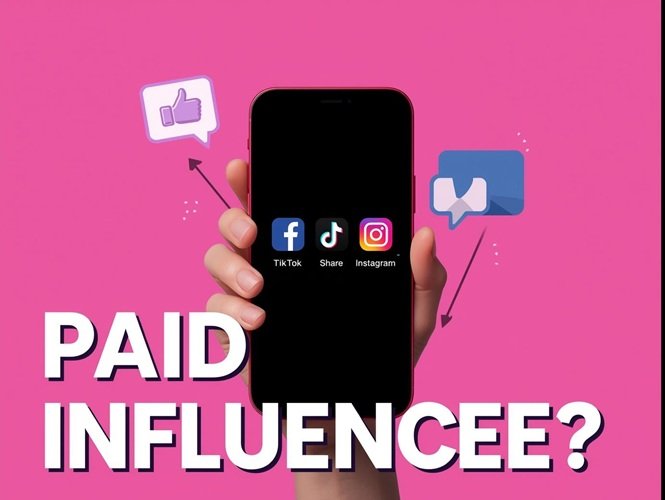When Influencers Are Paid to Shape Your Opinions

South Africans are waking up to a reality many have suspected but few truly understood: some of the posts you see from your favourite influencers may not be as innocent as they seem.
According to social media commentator Zibu Masotobe Sibiya, the rise of “paid influence” is not just about promoting products—it is quietly shaping political views and even national sentiment, often without disclosure.
In a recent post, Zibu Masotobe Sibiya argued that influencers on Facebook, TikTok, and other platforms should be forced to declare when they are paid to post content. “The public deserves UNSPONSORED reporting,” she wrote.
Also Read | ‘Dollarman’ Kidnapping Kingpin Shot Dead in South Africa
“When a page that normally posts facts suddenly posts advertisements without declaring they are being paid, they open themselves up legally. Influence must come with RESPONSIBILITY. Money is not everything.”
Her words highlight a growing concern: while platforms like Instagram have rules requiring influencers to declare sponsored posts, other platforms are more lenient. On Facebook and TikTok, there is no strict requirement, allowing paid content to blend in seamlessly with personal opinions.
This can mislead audiences into believing the influencer genuinely feels a certain way, when in fact they are being compensated to push a particular message.
Also Read | KZN Health to Hire 270 Medical Staff

For many South Africans, following an influencer is about trust. Fans admire them for their style, humour, or the lifestyle they project. But that trust can be exploited.
Sometimes, a favourite content creator suddenly posts messages against a certain political party, warns against foreign nationals, or endorses a candidate they’ve never mentioned before.
At first glance, it seems like a genuine opinion—but in reality, they may have been paid to promote these ideas.
It gets trickier when influencers or page owners are paid privately with instructions not to disclose the payment. On the surface, it looks like their own honest view, but it isn’t.
Experts call this “undisclosed paid influence.” Whether it happens on a personal profile, a professional-mode account, or a public Facebook page, the effect is the same: ordinary people see the post and assume it’s genuine.
Zibu Masotobe Sibiya warns that this is far from harmless. Paid influence can distort public perception, manipulate emotions, and even affect the way people vote or form opinions about others in society.
“I see so many male influencers post political narratives, what we call ‘seeding,’ and not declare that they are paid views,” she wrote.
This is not just about money changing minds—it’s about misleading the public. Paid opinions disguised as personal views can sway votes, stir tensions in communities, or promote ideas that people would never support if they knew the truth. Transparency is what keeps social media fair; without it, influence becomes manipulation.
Also Read | Tragedy in Umlazi: Body of Kidnapped Five-Year-Old Found in River
Why This Matters to South Africa
You might wonder: why is this a big deal? The answer is simple. When influencers are paid to push certain views, the very fabric of public debate is affected. This has real consequences:
- Undermining democracy – If influencers promote political messages without disclosure, voters may be swayed by messages they think are independent opinions. This gives an unfair advantage to candidates or parties who can afford to pay for influence.
- Spreading misinformation – Paid content is often exaggerated, selective, or misleading. Without knowing the content is sponsored, audiences cannot evaluate it critically.
- Stoking social tensions – Influencers can be hired to generate fear or anger, for instance by posting negative content about foreign nationals or certain communities. This can worsen xenophobia and division in society.
- Eroding trust – When followers eventually discover that their trusted influencers were being paid, they may lose faith not just in that influencer, but in social media as a whole.
Also Read | Simingaye Oscar Hlatshwayo Murderers Handed Life

Who Bears the Responsibility?
It’s not just influencers with thousands of followers who need to think twice. Even ordinary South Africans who use Facebook have responsibilities when their posts reach a wider audience.
A personal profile, for instance, is meant for sharing opinions with friends and family. But when someone switches their profile to “professional mode,” suddenly those posts become public, discoverable, and even monetizable. In that mode, every like, share, or comment carries weight.
Similarly, Facebook pages—used for businesses, communities, or personal branding—have an even larger reach. When the owner of a page posts a message, whether political or promotional, they are influencing a public audience. If that post is sponsored or paid for, it must be declared.
Zibu Masotobe Sibiya’s warning applies not just to high-profile influencers: “Influence must come with RESPONSIBILITY. Money is not everything.” Whether it’s a personal profile in professional mode, a business page, or a popular influencer account, South Africans must be aware of the power their words hold—and the ethical and legal duties that come with it.
Also Read | KZN Woman Murdered Abroad After System Ignored Her Warnings
The Legal Angle
In some countries, failing to disclose paid content can lead to legal consequences. Meta (Facebook’s parent company) has faced lawsuits for allowing undisclosed paid posts to circulate. South Africa has laws that touch on advertising and consumer protection, but enforcement in the digital space remains weak. This creates a grey area that unscrupulous actors can exploit.
How to Protect Yourself
Zibu Masotobe Sibiya’s post is a wake-up call. While not every influencer is paid to post political content, ordinary South Africans need to approach social media with caution:
- Question sudden changes in messaging – If someone you follow suddenly starts posting heavily about politics or controversial topics, consider whether they might have a financial motive.
- Look for disclosure – Some posts may say “sponsored” or “paid partnership.” If you don’t see these tags, it may be worth being skeptical.
- Diversify your information sources – Don’t rely solely on influencers for news or opinion. Traditional media, community discussions, and multiple viewpoints help you form a more balanced perspective.
Influence Comes With Responsibility
The point Zibu makes is simple: influence is powerful, but money cannot replace integrity. Influencers have a moral duty to their audiences.
Paid content is not inherently bad, but hiding it under the guise of personal opinion is. South Africans must be aware that likes, shares, and follows can be monetized, and that not everything online reflects genuine belief.
As Zibu concludes, transparency should be compulsory. “It kills our country when sponsored views are posted without declaration. Influence must come with RESPONSIBILITY; money is not everything.”
The cat is indeed out of the bag. South Africans must now ask themselves: how much of what they see online is truly genuine, and how much is being quietly bought? Understanding this is crucial—not just for protecting individual judgment, but for safeguarding the broader democratic and social health of the country.





